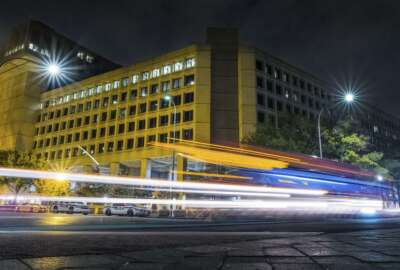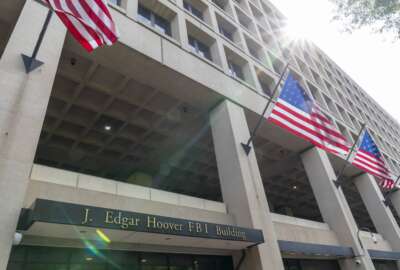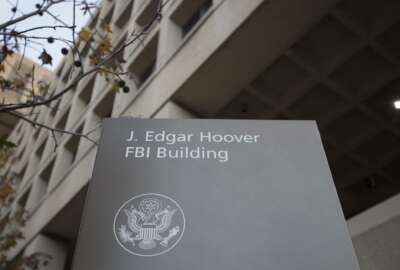Lawmakers scrutinize plan for new FBI headquarters, but agency says its current site is ‘failing’
More than 15 years after the federal government first planned for a new FBI headquarters, the crumbling J. Edgar Hoover Building is breaking down in ways that...
Congress and a federal watchdog are taking a closer look at much-scrutinized plans to build a new FBI headquarters in Greenbelt, Maryland.
But a top FBI official is warning lawmakers that the agency’s workforce is running into several problems with its current headquarters.
More than 15 years after the federal government originally planned for a new FBI headquarters, the crumbling J. Edgar Hoover Building is breaking down in ways that hamper the agency’s mission.
Meanwhile, the FBI has moved thousands of its employees out of the Washington, D.C. metro area over the past decade, and built up its presence at other campuses across the country.
Nets around the Hoover building perimeter keep chunks of concrete from falling off and hitting pedestrians.
But Nick Dimos, the assistant director of the FBI’s Finance and Facilities Division, told members of the House Transportation and Infrastructure Committee on Tuesday that parts of the building are also dropping onto employee workspaces and equipment.
“The FBI J. Edgar Hoover Building, quite frankly, is failing,” Dimos said during an economic development, public buildings and emergency management subcommittee hearing.
Dimos told lawmakers the FBI spent $75 million since 2011 to avoid a “catastrophic” breakdown of its water infrastructure.
“Pipe bursts and plumbing challenges are commonplace, leading to the damage of FBI space, IT and records,” he said.
Power and network infrastructure challenges at the Hoover building, he added, are “ever-present, resulting in disruptions to connectivity needed to coordinate FBI cases nationwide.”
Dimos said the federal government is spending millions of dollars on expensive commercial leases in the D.C. metro area, because the FBI workforce is “scattered across multiple locations” beyond the Hoover building.
Dimos said a “heroic team of experts” is working to maintain the facility, but the FBI knows the building is nearing the end of its life, and is only making essential repairs – not long-term upgrades.
“Knowing that this conversation has been ongoing about a new facility, we want to invest in the building to ensure that we’re keeping it stable and safe, and at the same time, not invest too much funding such that it would be imprudent,” Dimos said.
The FBI, he added, made some “incremental security investments” to the Hoover building over the years, but those improvements are limited by the age of the building.
“There are, of course, many security features that we cannot implement, given the 1974 construction,” Dimos said.
Lawmakers, however, are demanding answers about how the federal government’s landlord, the General Services Administration, arrived at its decision last month to build a new FBI headquarters in Greenbelt.
Subcommittee Chairman Scott Perry (R-Pa.) said that after 15 years of planning for a new FBI headquarters, “there hasn’t been a shovel in the ground — and of course, the costs ballooned, probably out of sight.”
Perry added that he’s “not convinced the FBI needs a brand-new building.”
“I’m not on board with the idea that the FBI needs a shiny new building at the taxpayers’ expense,” he said.
GSA’s inspector general is looking into the site selection process for the FBI’s new suburban headquarters. That’s after FBI Director Chris Wray raised concerns about how GSA reached its decision.
Wray told employees in an email immediately following GSA’s announcement that he had “concerns about fairness and transparency in the process and GSA’s failure to adhere to its own site selection plan.”
Wray said a three-member panel, made up of two career GSA officials and one career FBI official, originally recommended a new FBI headquarters in Springfield, Virginia, based on the criteria in its selection plan.
But in a second phase, former Public Buildings Service Commissioner Nina Albert, in her capacity as the site selection authority (SSA), diverged from the panel’s recommendations and chose Greenbelt.
Wray added that the “FBI raised a serious concern about the appearance of a lack of impartiality by the GSA senior executive,” because Albert previously served as an executive at the Washington Metropolitan Area Transit Authority (WMATA).
WMATA owns the parcel of land in Greenbelt where a future FBI headquarters would be built.
Dimos said the FBI requested GSA pick a new site selection authority to rerun the final step of the process — “picking an individual who did not have any previous affiliation with the three sites.”
“GSA did not accept this request and our concerns were not sufficiently addressed,” Dimos said.
The subcommittee requested Albert testify at the hearing, but Perry said she declined to appear.
“We’ll have to consider other options available to the subcommittee, so that we can hear her perspective in the future, which will be very important to getting to the bottom of this issue,” Perry said.
Dimos said the FBI does not object to GSA selecting Greenbelt as the final location for a new FBI headquarters, and the agency is also “not suggesting a lack of integrity on the part of the SSA.”
“However, for a decision of this magnitude, the process needs to be above reproach, and we continue to hold concerns about how the final stage of the process was conducted, he said.
GSA updated its criteria for selecting a new FBI headquarters site in July.
Maryland lawmakers, as part of a comprehensive spending deal for fiscal 2023, included language that required GSA to give added consideration to the Biden administration’s equity goals and overall project cost when selecting an FBI headquarters site.
That new criteria gave less consideration to each site’s proximity to the FBI Academy in Quantico, Virginia.
Dimos said that prior to the FY 2023 spending bill, “it was the FBI’s position that the optimal solution was to be in a newly constructed building closer to downtown Washington,” close to the Justice Department’s headquarters and other law enforcement partners.
“As long as a fair and transparent process is followed, we will follow the law and the law said that the FBI shall go to one of those three suburban sites,” he said.
Copyright © 2025 Federal News Network. All rights reserved. This website is not intended for users located within the European Economic Area.
Jory Heckman is a reporter at Federal News Network covering U.S. Postal Service, IRS, big data and technology issues.
Follow @jheckmanWFED






